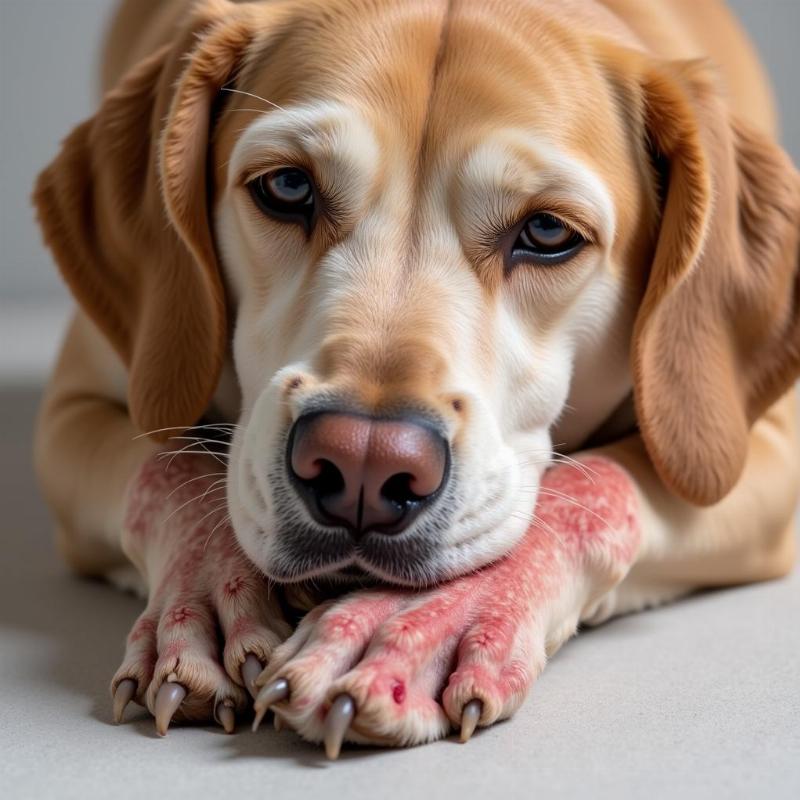Dry, flaky skin is a common problem for dogs, and it can be caused by a variety of factors, ranging from allergies and parasites to environmental conditions and nutritional deficiencies. If your furry friend is constantly scratching or you notice their skin is dull and flaky, it’s time to address the issue. Understanding the causes and implementing effective solutions can bring much-needed relief to your canine companion and restore their healthy coat. So, what is good for a dog’s dry skin? Let’s explore some proven strategies and remedies.
Identifying the Causes of Dry Skin in Dogs
Before diving into solutions, it’s crucial to identify the underlying cause of your dog’s dry skin. Several factors can contribute to this issue, and pinpointing the culprit will allow you to choose the most effective treatment.
Common Culprits Behind Canine Dry Skin
- Allergies: Environmental allergies (pollen, dust mites) and food allergies (beef, chicken, dairy) can manifest as dry, itchy skin.
- Parasites: Fleas, ticks, and mites can irritate the skin and lead to dryness and inflammation.
- Nutritional Deficiencies: A lack of essential fatty acids, particularly omega-3s and omega-6s, can contribute to dry skin and a dull coat.
- Environmental Factors: Low humidity, excessive bathing, and harsh shampoos can strip the skin of its natural oils, leading to dryness.
- Underlying Medical Conditions: Hypothyroidism and other hormonal imbalances can also cause dry skin in dogs.
 Dog with dry skin due to allergies
Dog with dry skin due to allergies
Effective Remedies for Dry Skin in Dogs
Once you have a better understanding of the potential causes, you can explore various remedies to alleviate your dog’s dry skin.
Dietary Adjustments for Healthier Skin
- Omega-3 and Omega-6 Fatty Acid Supplements: These essential fatty acids play a vital role in maintaining healthy skin and coat. Adding a fish oil or flaxseed oil supplement to your dog’s diet can significantly improve skin hydration and reduce inflammation. Consult your veterinarian for the appropriate dosage based on your dog’s breed and size.
- High-Quality Dog Food: Switching to a premium dog food formulated for skin and coat health can provide the necessary nutrients to support healthy skin function. Look for foods rich in omega fatty acids, vitamins, and minerals.
Topical Treatments for Dry, Itchy Skin
- Oatmeal Baths: Soaking your dog in a lukewarm bath with colloidal oatmeal can soothe irritated skin and reduce itching. Colloidal oatmeal is finely ground oatmeal that disperses evenly in water, creating a protective barrier on the skin.
- Moisturizing Shampoos and Conditioners: Opt for hypoallergenic and moisturizing shampoos and conditioners specifically designed for dogs with sensitive skin. Avoid harsh chemicals and fragrances that can further irritate the skin.
Preventing Dry Skin in Dogs
While treating existing dry skin is essential, proactive measures can prevent future occurrences.
Maintaining Optimal Skin Health
- Regular Grooming: Brushing your dog’s coat regularly helps distribute natural oils, remove dead skin cells, and improve circulation.
- Humidifier: Using a humidifier during dry months can add moisture to the air and prevent your dog’s skin from becoming dry and flaky.
- Parasite Prevention: Use flea and tick preventatives year-round to protect your dog from parasites that can irritate the skin.
Conclusion
Addressing your dog’s dry skin involves a combination of identifying the underlying cause and implementing effective remedies. By making dietary adjustments, using topical treatments, and adopting preventative measures, you can help your furry friend achieve healthy, hydrated skin and a lustrous coat. Remember to consult with your veterinarian for personalized advice and treatment options tailored to your dog’s specific needs. What is good for a dog’s dry skin ultimately depends on the individual dog, so working with a vet is crucial.
FAQ
- How often should I bathe my dog with dry skin? Bathing too frequently can strip the skin of its natural oils. Aim for bathing every 4-6 weeks, or as recommended by your veterinarian.
- Can I use human shampoo on my dog? No, human shampoos are formulated for human skin and can disrupt the pH balance of a dog’s skin, leading to dryness and irritation.
- What are the signs of a food allergy in dogs? Common signs of food allergies include itchy skin, digestive upset, ear infections, and excessive licking of paws.
- Are certain dog breeds more prone to dry skin? Yes, some breeds, such as Bulldogs, French Bulldogs, and Shar-Peis, are more susceptible to skin issues due to their skin folds and wrinkles.
- How can I tell if my dog has fleas? Signs of fleas include excessive scratching, biting at the skin, and small black specks (flea dirt) on the fur.
- What should I do if my dog’s dry skin doesn’t improve? If your dog’s dry skin persists despite trying various remedies, consult your veterinarian to rule out any underlying medical conditions.
- Can stress cause dry skin in dogs? While stress doesn’t directly cause dry skin, it can weaken the immune system, making dogs more susceptible to skin infections and other issues that can contribute to dryness.
Beautdogs.us is your premier destination for all things dog-related in the US. We provide expert advice on dog breeds, care, and lifestyle, offering a comprehensive resource for both new and experienced dog owners. Our expertise in canine health and well-being ensures you’ll find reliable information and product recommendations. For personalized guidance on dog care or breed-specific information, contact us at [email protected] or call us at +1 501-555-7529. Beautdogs.us is committed to helping you nurture the bond with your beloved canine companion.